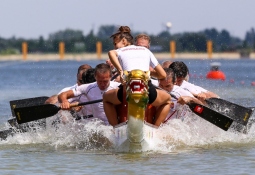World domination might still be some way off for Asia’s passionate canoe slalom community, but if determination and endeavour are part of the equation it might not be as far off as some might expect.
Certainly this year’s Asian Championships in Thailand has made a lot of people in the sport sit up and take notice, and not just because of the results.
What has also pleased the canoe slalom community is the efficiency in which the Championships were run.
The fledgling consortium brought together to run the event were asked to be the “guinea-pig” for a new international program, including the addition of women’s and a mixed C2, and the combining of senior, U23 and junior divisions.
The International Canoe Federation, the Asian Canoe Federation, and the Thailand Rowing and Canoe Federation shared the responsibility of running a much different Continental Championship.
“We actually managed to run three Asian Championships in the one place at the one time,” the ICF’s Pierrick Gosselin said.
“it was a bit complicated in the beginning, but by the end it was running well. We modified the canoes, and it was a success.”
By any measurement, it was a success. More than 300 athletes competed, from a broad range of Asian countries, including powerhouses like China and Japan, and up-and-coming nations like Iran, India, Kazakhstan, Singapore, Kyrgyzstan and Macau.
Gosselin said organisers were so buoyed by the success that they are hoping to make the Asian Championships an annual event.
He suspects in the future all three divisions won’t be held at the same time, with separate senior, U23 and U18 championships.
He believes the quality of paddler is on the rise.
“At the top level the very best paddlers are having to work ever harder to win medals,” he said.
“And the intermediate paddlers, their level has increased a lot. We had very few 50 second penalties for missed gates.
“Of course the global level of paddlers is way better, but that’s what makes having Asian U23 and U18 Championships so appealing.”
In the past suitable venues have always been a problem, but that is changing. Thailand is spending a lot of money on a world-class facility, Japan will have a new facility for the 2020 Olympics, and Singapore is on the look-out for available land.
Also driving confidence on the continent is the ongoing success of the International Canoe Federation’s Talent Identification Program (TIP). In Thailand the numbers were once again exciting, and Gosselin said the outcomes reached a new level.
“We have a template now for what TIP camps should be like for the next three or four years,” he said.
“The group here built their own gates, organised their own eskimo-roll sessions.
“We gave them the tools to be coaches, to fix boats, to set venues and to be judges. They can be the backbone of this program for the next few years.
“And as a result of the success in Thailand, we are planning to do the same thing in Skopje later this year.”

